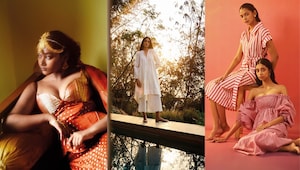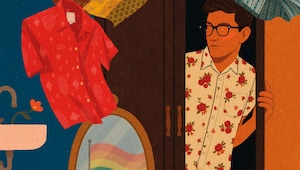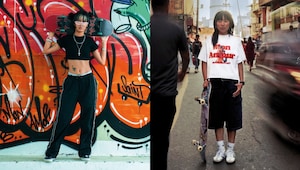How to Become an Informed Shopper?
Our guest columnist, Sujata Assomull, a mindful fashion advocate, makes a strong case for ‘good fashion’ and what a conscious consumer should take into account.

“The one constant in fashion is change. But the way things have changed in the last few years can only be called a revolution. A decade ago, we were hailing the advent of well-priced and accessible fashion, as the democratisation of fashion. Finally, fashion wasn’t just for the privileged, everyone had access to style—thanks to stores like Zara, H&M and Forever 21. It became known as ‘Fast Fashion’ because of the way these stores were churning out new styles. It was all about consumption, on demand. Impulse shopping could now be indulged in with ease, and what more could a fashion-inclined girl ask for?
KNOW THE FACTS
But this seemingly perfect sartorial situation came with some serious flaws. The cost of all this was Earth-shattering, literally! Fashion has now earned itself the position of the second biggest polluter in the world. We throw out an estimated 50 million tonnes of clothing every year, and the impact of this is life-threatening. Then there are the issues of water, climate, and ethics. Who can forget the 2013 Rana Plaza Tragedy in Bangladesh, in which a poorly maintained factory collapsed, killing over 1,100 people, and injuring about 2,500, who were all working for a pittance? Just last month, about 40 workers died in Delhi in a fire at an illegal factory that made school bags.
Unless fashion cleans up its act, it’ll be responsible for ending life on Earth as we know it. As Greta Thunberg said, ‘We already have all the facts and solutions. All we have to do is wake up and change.’ And so, sustainability has become the new buzzword—be it Gucci or Gap, they’re all taking steps to be responsible for the impact fashion has on everything around us.
THE NEW MATERIAL WORLD
It’s now time to be an informed shopper. Being ‘materialistic’ today has a new, positive meaning. And it’s not as simple as just choosing natural fabrics over synthetic. Take conventional cotton as an example. It takes 20,000 gallons of water to make a single pair of denim cotton jeans, and up to 3,000 to make a T-shirt. Plus, this thirsty plant requires a high level of pesticides (which contain toxins) to grow. Cotton is an enemy of environment. Leather and fur are a complete no-no, find other ways to keep warm. When it comes to silk, too, we’re hearing of many ethical issues: there’s a human cost, as some silk producers don’t pay fair wages; there are child labour issues as well. Which is why you need to ask the question: ‘Who made my clothes?’.
Often, man-made materials, referred to as futuristic fabrics, are better options. They are made from cellulose (which is plant-derived, hence, biodegradable), or recycled (that follow the reuse-and-repurpose mantra). Tencel and Econyl are great examples, and labels such as Tibi and Anita Dongre, among others, are using these fabrics.
SPEND SMART
Yes, these pieces are more expensive. But we need to spend on ‘good fashion’. Balance it out by buying less, but buying well...be a smart shopper. You need to stay updated. Google labels when in doubt (just make sure it’s a reliable source). Instead of following brands and influencers that make you want to shop, choose websites and women who look at fashion through a mindful eye. No-one is telling you to stop being a fashion girl, it’s just being a responsible fashion girl.
 Rajesh Pratap Siunghl
Rajesh Pratap Siunghl
 Anita Dongre
Anita Dongre
 Amit Aggarwal
Amit Aggarwal
 Amit Aggarwal
Amit Aggarwal
BUY SOMETHING WHEN YOU LOVE IT
Just because a garment is ethical or sustainable doesn’t mean you should buy it. When you love something, you’ll want to repeat it. As I often say, it’s chic to repeat. Did you know that, by extending the lifespan of your clothes by just nine extra months of active use, you’d be reducing carbon, water, and waste footprints by around 20%-30% each? Only shop when you feel good—you tend to shop less when you’re in a positive frame of mind, which is why you should never shop in your sweats and no make-up, or check out e-tail websites when bored.
And ask yourself these questions: ‘Will I wear it at least 30 times?’, ‘Is it filling a gap in my wardrobe?’, ‘Does it work with the other pieces I own?’. Remember, evening pieces are meant to be special buys—if you know you’re only going to wear it once, look at renting it, instead. For statement accessories, pre-loved is an option that’s better, both on your wallet and the environment. And that’s what ‘good fashion’ is all about today. It’s about being a conscious consumer and still being on-trend. And the added benefits are that, in the long run, you’ll have a more stylish wardrobe and will be spending money wisely.”
There are a number of brands, from Tibi and Stella McCartney to Rahul Mishra, Anita Dongre and more, that are working with sustainable and ethical fashion
 Tibi
Tibi
 Rahul Misra
Rahul Misra
 Stella McCartney
Stella McCartney
 Pero by Aneeth Arora
Pero by Aneeth Arora
Abraham & Thakore
Nicobar is one of the homegrown brands that uses sustainable materials like Cupro and Modal to make products

Worldwide protests against Fast Fashion, due to the dangers it poses, are now quite common

more from Fashion

Subiksha Shivakumar is rewriting what it means to be a modern model

Five Bengaluru designers to have on your radar

How Manika Batra is turning athlete fashion into a personal power play

A love letter to florals and the beauty of growing beyond the lines

Meet the Nepal skaters turning anime, Y2K and metal music into a fashion movement

Six fashion insiders on the chaos, clarity, and creativity behind their wardrobes

The Cosmo-approved holiday beauty list to help you glow through party season

Why 'Heated Rivalry' has everyone hot, bothered, and obsessed

Regal revivals, fashion shake-ups, and everything new we’re obsessing over this month

When is the new season of 'Euphoria' out? Plus 5 things we know about it
